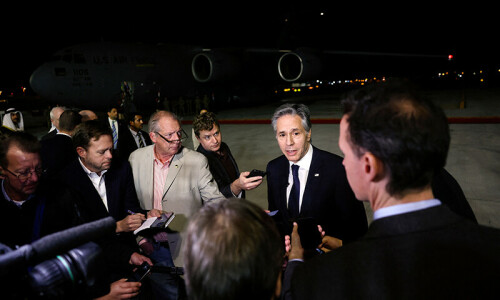• Winter rains aggravate catastrophic humanitarian situation
• UN official says Israel’s ‘inhumanity beyond comprehension’
GAZA CITY: Israeli strikes killed 60 people in Gaza Strip on Saturday amid a telecommunications blackout in the besieged territory on the 99th day since the Oct 7 Hamas raid.
Fears of the conflict widening intensified after US and British forces struck pro-Hamas Houthi rebels in Yemen following attacks on Red Sea shipping, with the US military announcing a fresh air strike on Saturday.
Witnesses reported Israeli bombardment in the early morning and that intense shelling hit the Palestinian territory’s south on Friday night.
“I was visiting my sister, and when I returned I found my house was bombed,” said 60-year-old Samir Qashta, a resident of Rafah in southern Gaza, where many people have fled.
“Is my house hurting Israel in any way?”
Israel’s relentless bombardment of Gaza since the Oct 7 raid has killed 23,843 Palestinians, mostly women and children, according to an updated toll on Saturday.
At Rafah’s Al Najjar hospital, mourners gathered and prayed around the bodies of slain relatives. One man held the body of a child, wrapped in white cloth, ahead of burial.
Internet and telecommunications services were cut on Friday as a result of Israeli bombardment, the main operator Paltel said, reporting the latest such disruption.
The Palestinian Red Crescent posted that the outage was increasing the challenges in “reaching the wounded and injured promptly”.
Winter rains have exacerbated the dire humanitarian situation in Gaza, where the UN estimates 1.9 million people — nearly 85 percent of the population — have been displaced. Many have sought shelter in Rafah and other southern areas.
“It was a harsh and difficult night,” said Nabila Abu Zayed, 40, who now lives in a tent at Al Nasser hospital in Khan Yunis.
“The rain flooded our tent... We spent the night standing with hundreds of displaced people like us in the corridors of the maternity ward,” she said.
“It was very cold and we had no winter clothes or blankets. All of my children are sick.”
“There was bombing through the night,” said Abu Zayed. “Where will we go?”
`Inhumanity beyond comprehension’
The United Nations humanitarian office, OCHA, said that Israel was blocking aid convoys into northern Gaza.
“They have been very systematic in not allowing us to support hospitals,” said OCHA’s head for the Palestinian territories, Andrea De Domenico, decrying “a level of inhumanity beyond comprehension.”
In central Gaza, a lack of fuel forced the shutdown of the main generator of Al Aqsa Martyrs Hospital in Deir el Balah, the health ministry said.
Health ministry spokesman Qudra accused Israel of “deliberately targeting hospitals... to put them out of service”, warning of “devastating repercussions”.
Hospitals, protected under international humanitarian law, have repeatedly been hit by Israeli strikes in Gaza.
Fewer than half of Gaza’s hospitals are partly functioning, according to the World Health Organisation.
Concern for prisoners
In Israel, concern grew for prisoners held in Gaza as they approach their 100th day in captivity.
Palestinian militants on October 7 seized about 250 hostages, 132 of whom Israel says remain in Gaza, including at least 25 believed to have been killed.
On Friday, Israeli Prime Minister Benjamin Netanyahu’s office said a deal had been negotiated with Qatar to get medicine to the captives.
Israeli campaign group Hostages and Missing Families Forum released a report this week saying the captives were in poor health, some with complex illnesses, others with injuries.
A diplomat familiar with the negotiations said both sides had expressed a willingness to allow the delivery of medicines, and a source close to Hamas said talks were ongoing.
Israel criticised the UN human rights office for not reiterating its calls for the release of prisoners in a statement marking the looming 100th day of the conflict.
“A call for a ceasefire, without demanding the release of our hostages and the disarming of Hamas, is a call for terrorism to win,” its mission in Geneva said.
‘Life should go on’
The relentless Israeli bombing didn’t stop Gaza couple Afnan Jibril and Mustafa Shamlakh from getting married in Rafah.
“The house where the groom was supposed to live was destroyed,” Ayman Shamlakh, the groom’s uncle, said.
“We are all living through the same tragedy. However, we must continue to live, and life should go on.”
In the Israeli-occupied West Bank, where violence has surged since October, Israeli troops killed three Palestinians after accusing them of attacking a Jewish settlement.
Palestinian news agency Wafa identified the three killed as a 19-year-old and two 16-year-olds.
Published in Dawn, January 14th, 2024















































Dear visitor, the comments section is undergoing an overhaul and will return soon.